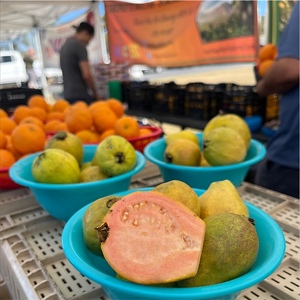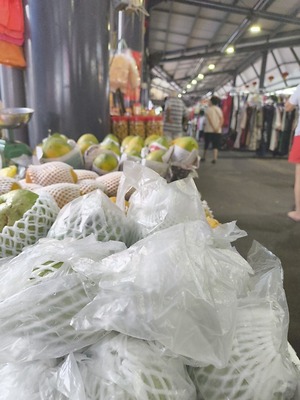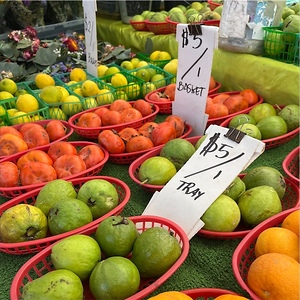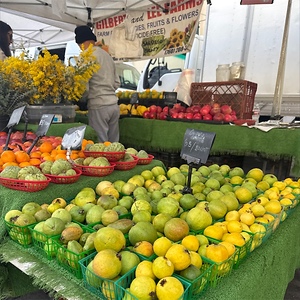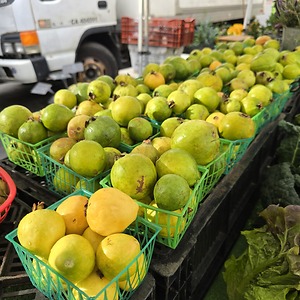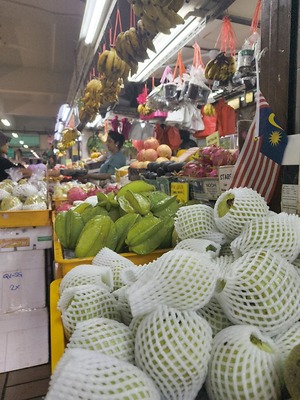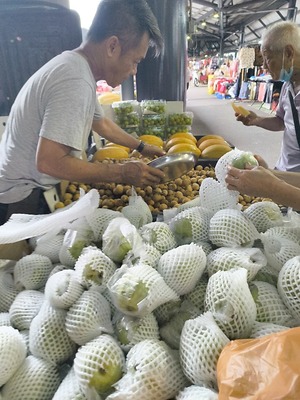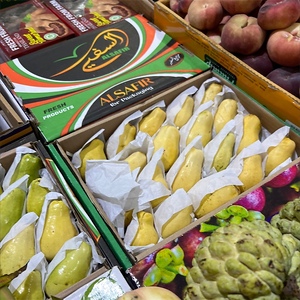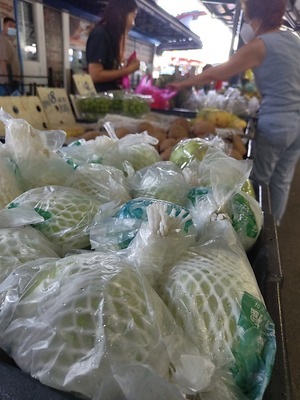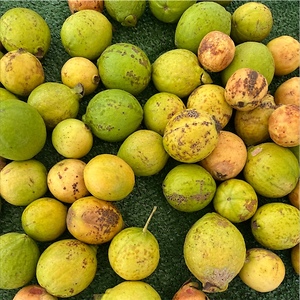


Guavas
Estimated Inventory, 10 lbs : 1.28
This item was last sold on : 06/29/25
Description/Taste
Guavas are tropical fruits that weigh about 25 to 500 grams and vary in appearance. They may have an oblate, rounded, oval, cylindrical, or lemon-like shape depending on the type. Guavas are about 5 to 12 centimeters long and 3 to 6 centimeters wide with yellow, green, or red skin that may exhibit patches of other colors depending on their point of ripeness. Guava skin is typically shiny and thin, with a texture that can range from smooth to bumpy. The fruits' granular flesh may be white, cream, orange, coral, or various shades of pink, with a texture that combines elements of both bananas and apples. This flesh is firm on the outside, gradually becoming juicy and pulp-like toward its central cavity. Guavas contain robust seeds that are sometimes hard enough to break teeth. They have a strong tropical aroma with a hint of musk. Guavas possess a distinctly sweet flavor that’s acidic with notes of pineapple, papaya, banana, and lemon.
Seasons/Availability
In their native warm climates, Guavas are primarily available in the summer and have a smaller harvest in the winter.
Current Facts
Guavas are botanically classified as Psidium guajava and belong to the Myrtaceae family, which also includes cloves, allspice, and eucalyptus. They come in several varieties like Lemon, Red Malaysian, and Tropical Pink, White, and Yellow guavas. These fruits have been naturalized to many regions of the world where they have taken on different names. Often referred to as Apple guavas, this fruit is also called Jambu Batu in Malay and Indonesian, Goiaba in Portuguese, and Guayava in Spanish. Guavas grow on trees with short, thick trunks, white flowers, and sprawling branches that may reach up to 10 meters tall. Despite being native to the tropical regions of America, Guavas have become an important fruit in Southeast Asia, where they are included in traditional recipes and poetry.
Nutritional Value
Guavas are a source of vitamins A, B, and C. These vitamins are important for immune and brain function, cellular growth, skin health, energy and collagen production, and infection defense. These fruits also contain niacin and phosphorus, encouraging cholesterol management, blood circulation, inflammation reduction, and acid-base balance in the body. Guavas have potassium and calcium to regulate blood pressure and sodium levels, control muscle function and contraction, maintain healthy bones and teeth, and support nerve transmission. They provide the body with fiber and iron, bolstering digestion, heart health, oxygen transportation, and energy levels as well as helping reduce cholesterol levels and constipation. Guavas have been valued in traditional medicine, with their edible leaves chewed to treat diarrhea, rubbed on the skin to alleviate roughness and body odor, and made into decoctions for relieving stomach aches.
Applications
Guavas can be enjoyed fresh, baked, sautéed, caramelized, puréed, preserved, and dried. They are frequently eaten fresh out of hand or chopped up for salads, salsas, yogurt, fruit bowls, smoothies, or cake toppings. They may be stewed or puréed to make pies, pastries, tarts, cakes, jams, empanadas, and barbeque sauces. Fresh Guavas are also an ideal dessert ingredient in ice cream, gelato, sorbet, panna cotta and custard. These fruits are often used to make liquids like cocktails, syrups, and juices. Guavas are featured in recipes worldwide, including a Filipino pork and guava soup called sinigang na bayabas, an Indonesian pickled fruit salad known as asinan buah, and a crunchy, spicy dish from Malaysia called rojak. Guavas are complemented by the flavors of bananas, chocolate, mango, ginger, pears, vanilla, cinnamon, and sweet wines such as Gewurtztraminer. They can also be paired with soft cheeses such as chevre and mascarpone and proteins like shrimp, scallops, halibut, bacon, and pork chops. Fresh Guavas can be kept at room temperature for up to 7 days.
Ethnic/Cultural Info
There is a Filipino legend that ties the origins of the guava tree with the death of a cold-hearted king named Barabas. In this story, the king lived an affluent life while the people of his kingdom were starving. When a poverty-stricken woman approached him asking for food, he turned her away, and soon after he died. Once the king was buried, a tree bearing fruit with crown-like shapes began to grow on his grave. These Guava fruits were as sour as the king but as they ripened, turned sweet and helped cure people of starvation. Because the fruit reminded citizens of the king, Guavas are called Barabas in the Filipino language of Tagalog.
Geography/History
Guavas are native to Mexico, Central America, the Caribbean, and South America. They are sown in tropical and subtropical climates where they may grow in wild forests, disturbed areas, and along riverbanks. Guavas have been consumed for over 5,000 years in their native regions. In the early 1500s, Europeans likely first encountered these fruits when the Spanish arrived in Haiti. Spanish and Portuguese colonists then introduced Guava to Southeast Asia in the late 15th and 16th centuries, and they reached Hawaii and Florida in the early 19th century. Guavas remain a popular fruit in tropical zones worldwide, where they are grown in both commercial groves and home gardens. In warm climates, they can be found at grocery stores and farmers' markets, while specialty stores focused on tropical fruits may carry them in colder areas.
Featured Restaurants
Restaurants currently purchasing this product as an ingredient for their menu.
| Culinary Kitchen Catering and Events | Coronado CA | 619-798-8477 |
| Black Radish | San Diego CA | 619-775-7412 |
| Kingfisher | San Diego CA | 619-861-8074 |
| Finca North Park | San Diego CA | 619-581-3003 |
| Claytons Bakery & Bistro | Coronado CA | 619-435-5425 |
| Copper Kings | San Marcos CA | 323-810-1662 |
| Saint Mark Golf and Resort, LLC (Bar) | San Marcos CA | 508-320-6644 |
| Part Time Lover | San Diego CA | 619-588-2411 |
| Campfire Bar | Carlsbad CA | 858-231-0862 |
| Grass Skirt (Bar) | San Diego CA | 858-412-5237 |
Recipe Ideas
Recipes that include Guavas. One



